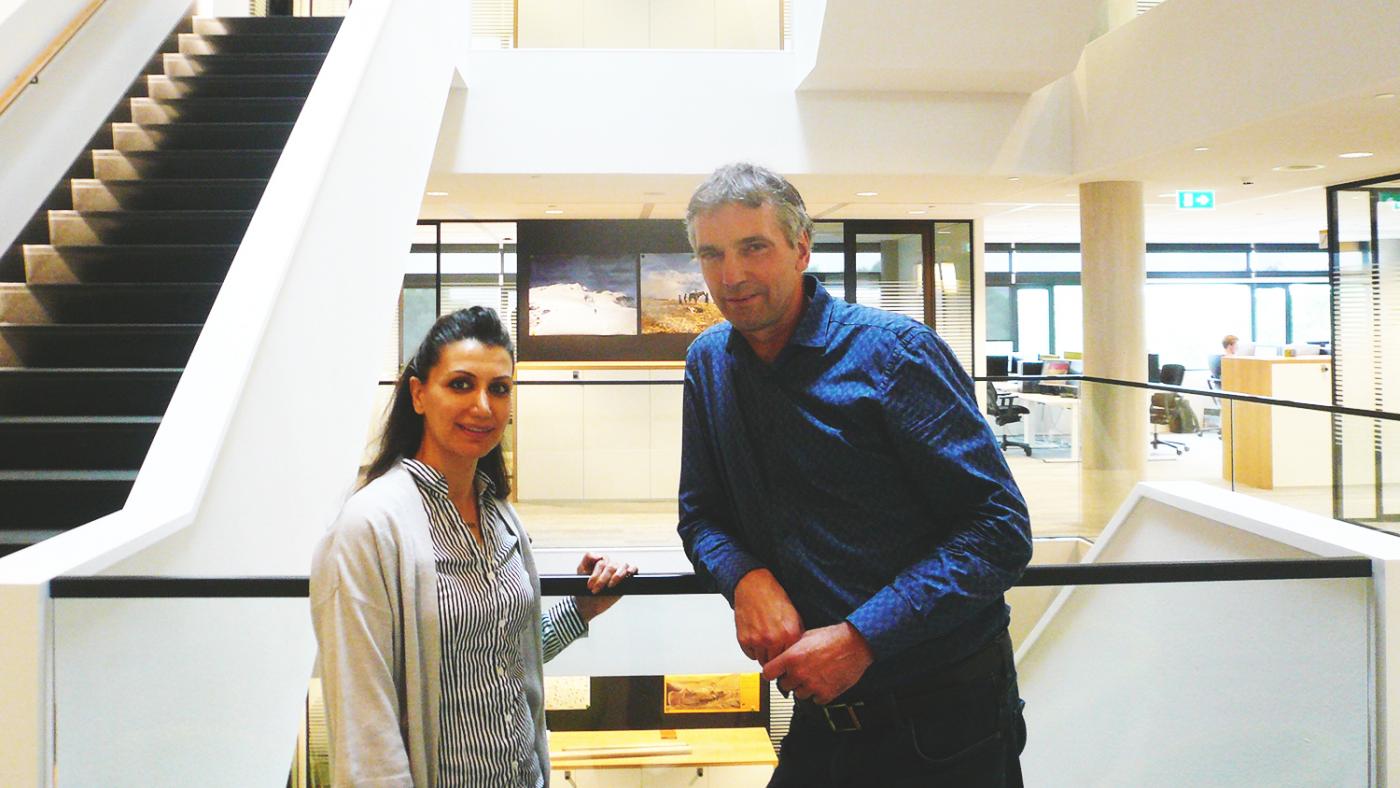‘A year isn’t long enough to get a scientific career off the ground’

Right between the office of Steven de Jong, professor of Physical Geography, and Safaa Naffa’s workplace, there’s a map on the wall that displays Surinam’s coastal area, the region the two are researching. Safaa, who’s from Syria, uses computer model PCRGLOB to study what happens to Surinam’s coast when the flow of sediment from the Amazon changes due to deforestation and climate change. The remarkable thing about this project is that Safaa received a special NWO grant (see box) for refugee scientists.
It took quite some doing before Safaa (39) was able to start working for De Jong on March 1 of this year. Before, she’d been working for Deltares in Delft, an institute for applied science in the field of water and subsurface. “My contract expired, and I was looking for a new job. After a lot of searching and asking around in my network, I found the possibility NWO offered, the grant for refugee scientists. Then I came into contact with Steven, and when we met, it turned out we clicked nicely.” Steven adds that he had an ongoing project that fit well with Safaa’s interests. “She wrote me a letter in the right tone, and she turned out to be technologically strong.” The duo wrote a research proposal in no time, which was eventually accepted by the NWO.
I want to give Safaa a good start
In Syria, Safaa studied Agriculture Engineering, and graduated from her Bachelor’s in 2001. She was 23 at the time. After graduation, she got a job at the Ministry of Environment, and worked on water scarcity. “Later on, I worked as a consultant in the United Arab Emirates, but I wanted to do a Master’s in Europe. The Netherlands is ahead in water management, which is why I wanted to study in Delft. In 2013, I received a grant from the World Bank (an institute for development cooperation, ed.) and I was able to get started.” The war in Syria, which started in 2011, became worse and worse. “I decided to apply for asylum in the Netherlands. After my Master’s, I got a job at Unesco working on the project Water scarcity in the Middle East and Africa, and after that, I worked at Deltares for a year on the same topic.”
Steven de Jong and Safaa created a plan together in order to make as efficient use as possible of the one year the research financing lasts. A year isn’t long to get a scientific career off the ground, the professor says. “I want to give Safaa a good start so she’ll be able to continue after this project – for instance through a PhD track within my research group, or elsewhere at a university or engineering organisation. Either way, it’s important for her to extend her network, and I see it as my duty to contribute to that.”
In the coffee breaks, I practice Dutch with my colleagues
Safaa: “I started with a course on Spatial Dynamic Modelling to get a good start. Thanks to that, I can adjust the Amazon model myself, to use for my own research.” Steven adds that Safaa is very curious and inquisitive, and that she now masters the programming language used for the model. After collecting the data, Safaa will write an article for a scientific journal, and then the year will be over.
Safaa works on, and tries to use as many of the possibilities offered by the university as possible. She explains that the culture at Syrian universities is very different. “Steven listens to my plans and ideas, and he asks questions. He doesn’t tell me what I should or shouldn’t do, and that’s very different from Syria. There, it’s more set in stone what students have to do. On top of that, there are tons of sources here, such as online magazines.” In the meantime, she’s working on her English and her Dutch. “In the coffee breaks, I practice Dutch with my colleagues, who are thankfully very patient.”
Safaa’s research is the missing piece
“When Safaa receives a Dutch email from the university that she doesn’t understand, I help her,” Steven adds. “I make sure she feels at home here, and that she socialises with the PhD candidates. For her research, she has access to all the resources that we have. Every couple of weeks, we discuss the progress.”
Safaa acknowledges that Steven is helpful and supportive. They say the cooperation is a success. The key, both say, is in good communication. Steven calls Safaa open, and Safaa feels comfortable enough with Steven to say what she needs.
Safaa’s research fits in the larger NWO Wotro project about mangroves and migrating mud banks at the coast of British and French Guyana and Surinam. “It’s amazing that Safaa is conducting her research. The Amazon work is the missing piece in our project.” Surinam, Safaa and Steven say, is very vulnerable to changes, because it’s a low-lying country and most inhabitants live close to the coast. Paramaribo already suffers from floods, and this will likely only get worse. Surinam will likely have to deal with heavy, often recurring storms.
There are four refugee scientists at Utrecht University, who were each given a special grant from research financer NWO. NWO reserved 750,000 euros for twelve projects in the Netherlands for the pilot ‘Refugees in science’. Of the 48 applications, 12 were accepted; four of these are from Utrecht. DUB has spoken with two of these, together with their professors. The first interview, with historians Ugur Üngör and Ali al Jasim, was published on July 1, 2019: ‘Ali is an eyewitness too’.
The NWO pilot will be continued. The grant for a period of 1.5 years will now be called Hestia – Impulse for Refugees in Science. The refugees who received grants this year are not allowed to apply for a Hestia grant again.